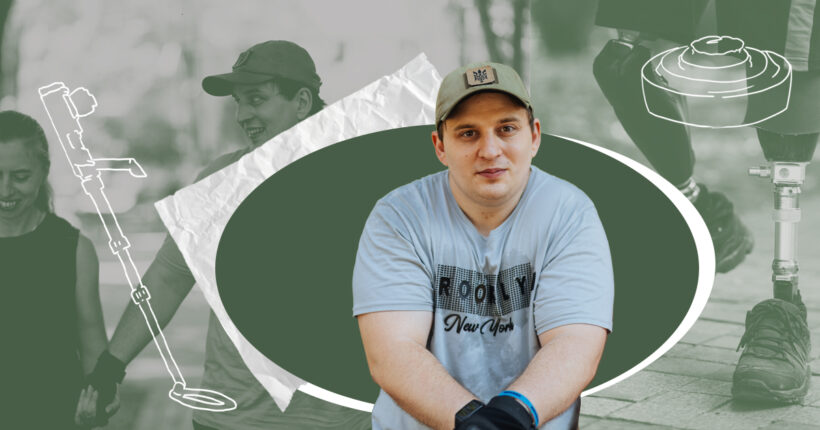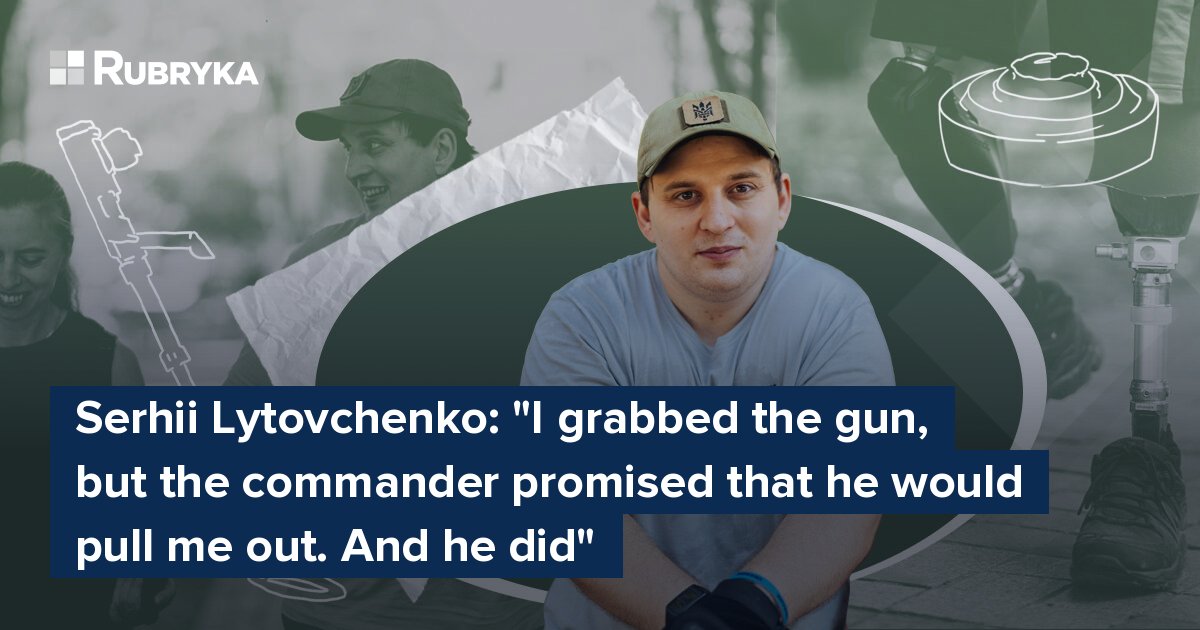
Now, Lytovchenko is learning to use advanced electronic prosthetics, with the goal of becoming a prosthetist himself, so that he can help others facing similar challenges.
"When Russian soldiers come, people die"
On February 24, Lytovchenko first encountered the explosions while traveling by train from Brovary to Kyiv. Witnessing rockets falling and exploding about a kilometer or so from his home, he quickly returned to Brovary.
"We didn't want to leave. I had already fled one home, from unemployment in Lysychansk. I didn't want to leave my second home," he says.

Serhii Lytovchenko. Photo: BGV Charity Fund
Upon returning to Brovary, Lytovchenko went straight to the military commissariat but was told to wait. Two weeks later, he took his wife and daughter to Transcarpathia to escape the shelling. There, he managed to enlist in the army.
"I decided to join the military after the Russians bombed warehouses in Brovary. The explosion was so loud that I grabbed my daughter and ran to the bathroom. She asked me, 'Dad, are we going to die?' When I asked where she got that idea, she said, 'Because when Russian soldiers come, people die.' She was only six years old! That's why I decided to serve, to prevent the war from reaching my home," Lytovchenko recalls.
"I would not forgive myself for this"
Eventually, the soldier was assigned to the 5th Separate Kyiv Assault Brigade, which had just been formed. He took on the role of senior sapper-grenade thrower. For four months, he carried out combat missions in the Avdiivka direction.
"Our battalion suffered very seriously. We were short on people, but positions had to be held. As sappers, we went to the observation post. We knew that mine protection was very poorly done. So, we began auditing minefields, laying mines to prevent the Russians from advancing near Horlivka," Lytovchenko explains.

Serhii Lytovchenko. Photo: BGV Charity Fund
Later, the commanders decided to scout another trail that could potentially be used by the enemy. Lytovchenko was injured during this mission.
"We went in a group—three sappers and two commanders. There was an explosion near my friend. We were about 10 meters apart. The explosion happened near him, and everything flew into me. It might have been a strike, but we never figured it out.
I looked down and saw that my legs were like rags. I was dragged by my comrades for about a kilometer. I knew the enemies were just 200 meters away and could eliminate the whole group. I would not have forgiven myself if something happened. I wanted to end my life and grabbed the gun, but the company commander stopped me. He said he would pull me out. And he did," the veteran recalls.
"This is the price for the freedom of the Ukrainian people"
First, Lytovchenko was evacuated to a hospital in Dnipro, then transferred to Kyiv. While he was being treated, he couldn't say his name correctly, so he gave the medics his badge, but they got it wrong. Because of this, his wife could not find him for a long time. In all the hospitals, she was told that such a wounded person had not been admitted. Eventually, she discovered where her husband was, thanks to Lytovchenko's comrades who directly evacuated him.
"We did not see the injury as something unexpected. This is war. This is the price for the freedom of the Ukrainian people. We pay with our health, with our lives. When I went to serve, I prepared myself for the fact that it was a war and I might return with an injury or not at all," the veteran shares.

In the end, he received free prostheses from the state. Lytovchenko says they are high-quality and among the best available, but they are mechanical and thus less functional compared to electronic ones. Realizing this, he began searching for opportunities to get more multi-functional prostheses.

Serhii Lytovchenko with his wife. Photo: BGV Charity Fund
A volunteer friend suggested starting a fundraiser for them, but Lytovhcneko felt it was essential that donations primarily support the army. The friend then introduced him to another volunteer who informed him about a prosthetics program run by the Estonian government in partnership with the BGV Charitable Foundation. Soon, Lytovchenko traveled to Estonia, where he received new prostheses and training on how to use them.
"The conditions were incredible. There is a very large Ukrainian diaspora there, and half of the doctors are from Ukraine. We were even given tours of Tallinn once a week. I am very grateful to the people of Estonia and BGV for giving us this chance to return to normal life," says the veteran.

Prosthetics of Serhii Lytovchenko. Photo: BGV Charity Fund
Nowadays, he takes at least six thousand steps every day. He has been using new electronic prostheses for over eight months and his record so far is 12.5 thousand steps in a single day. He laughs, saying that after such a "marathon," he slept for half a day.
Now, Lytovchnko plans to study to become a prosthetist or rehabilitator and work at a veterans' center in Boryspil. He does not intend to return to his previous job; instead, he wants to help people with similar injuries, as no one else will understand their experiences as he does.

Serhii Lytovchenko with his wife. Photo: BGV Charity Fund
"Now we are deciding on studies. You have to love your job. I enjoyed my civilian job, then I liked being a sapper, even though it was only for a short time. Now I have a passion for rehabilitation. Engaging in a field that benefits others can also help you return to a normal life," concludes the veteran.
Lytovchenko's rehabilitation is still ongoing, but he notes that his life has already become much easier. He can move, spend quality time with his family, and make plans, all while hoping for Ukraine's victory.
The "Faces of Strength" series was created as part of a special project by the Ukrainian BGV Charity Fund and the Rubryka Solutions Media to express gratitude to the Republic of Estonia for its ongoing support, with the hope of continuing the prosthetics program for Ukrainians. You can support the prosthetics of Ukrainian defenders by following the link HERE. Your contribution will cover the logistical costs for program participants.






